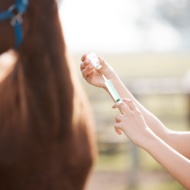Advice pack launched for adopters of retired greyhounds
The Welcome Pack is available online as well as from GBGB-approved homing centres.
A welcome pack to support people adopting retired racing greyhounds has been launched by the Greyhound Board of Great Britain (GBGB).
The pack contains advice on how to support their transition to living in a domestic environment as well as their ongoing care, including how to deal with issues such as osteoarthritis and separation anxiety. It also includes general information about the breed and its history.
The new pack is part of efforts by GBGB to optimise the welfare of the animals involved in greyhound racing through its long-term welfare strategy, ‘A Good Life for Every Greyhound’. The sport has received criticism from animal welfare charities in recent years, including calls for it to be banned from the RSPCA, Dogs Trust, and Blue Cross.
The pack is available on the GBGB website and has been sent to all homing centres approved by GBGB’s Greyhound Retirement Scheme (GRS).
It is a requirement for all greyhounds registered at GBGB-licensed tracks to take part in the scheme, which has supported more than 11,000 greyhounds to find a home after retiring from racing.
Paula Beniston, GBGB welfare manager, said: “Our ambition is that every greyhound leaving our sport goes on to enjoy a happy, healthy retirement after their career on the track.
“We hope that this literature is useful for our approved homing centres to share with new owners and will complement the excellent advice and ongoing support they already supply to ensure successful retirement placements.
“This is the first stage of our aim to increase the breed-specific advice and support offered to owners of retired greyhounds.
“We will continue to add to this Welcome Pack and, in time, we hope to develop this into an online support platform which will be a central information point for anyone welcoming an ex-racer into their home.”
Image © Shutterstock



 Zoetis UK has apologised for a supply shortage of Equip Artervac, caused by a manufacturing issue.
Zoetis UK has apologised for a supply shortage of Equip Artervac, caused by a manufacturing issue.